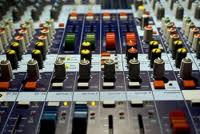|
|
Mastering Your Music
If you are planning to release your music
commercially and be in any real competition with other commercial recordings coming out into the market, you will definitely
need to have your music mastered. In the mastering procedure, final adjustments to volume level, equalization, compression,
spatial enhancements, etc. can be made to your mix, to give it that "polished" sound you normally hear on most major
label recordings. This is important, so that the overall tone and level of your music will be in good running with
the other CDs and Digital Downloads being released commercially and played on radio and in nightclubs.
Mastering your music is very important
and should not be in the slightest way taken for granted. The mastering process is the last stage to "tweak" and
technically improve the sound of the final mix before it is ready for release. Our best advice -- Know that you should always
get a professional mastering engineer and studio, or you may be asking for a lot of unneeded headache and grief. Also, take
a look at the credits of virtually any successful release, and you will see that labels and production companies normally
use a very specialized professional for Mastering, and not the same people doing the mix, or the same guys who recorded the
song. Why? Because pro mastering services make what was recorded and mixed sound better. So when you hire a great mastering
engineer and facility to put that final "magic" into your record, it's normally worth whatever the cost is. Know
this: when you hire a mastering professional, you are paying for not only a great room and gear, but you are also paying for
intangible things like the experience, and the "ears" of a mastering engineer; a guy that makes a living from "tweaking"
records. Mastering is also as much an art as it is knowledge and technique.

Now because of today's world of home recording,
desktop studio programs, and software plug-ins, many new producers and artists are led to believe that they can simply take
their mixes and run it through a few "pre-set" compressor and EQ plug-in settings in their computer software and
get the same pro results that they hear on their favorite CDs that are mastered out of New York, Los Angeles, Nashville,
or Atlanta. But, the truth is that Mastering begins with an experienced Mastering engineer with experience and great ears,
and then, the mastering suite or studio control room environment, and then the equipment in that control room. In the professional
mastering process, the engineer will optimize the level of your music, take out noise, clicks, etc., and "clean up"
starts and fades of songs, do equalization and compression and de-ess parts as needed, arrange the order, and insert space
between songs. He may also do other things like inserting PQ codes for CD replication.
When you have reached that point where
you have worked your best to get a song and performance recorded and then mixed well, then please, don't skip the Mastering
phase of the project. And even more important, don't leave the mastering "process" to the hands of someone without
the experience, knowledge and gear to really get the job done correctly. Just because your buddy bought the latest mastering
software for his or your computer, doesn't mean he can actually do a good mastering job on your final mixes. Actually, you
may end up doing more harm to your tracks than good. Important Note: most real mastering engineers HATE the
idea of someone bringing in a "half" mastered mess - to be fixed up by them, and then (re) "mastered"
correctly.
For more click below:
|